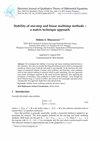时滞微分方程的温和解、常数公式的变分和线性化稳定性
IF 0.8
4区 数学
Q1 MATHEMATICS
Electronic Journal of Qualitative Theory of Differential Equations
Pub Date : 2022-07-04
DOI:10.14232/ejqtde.2023.1.32
引用次数: 0
摘要
常微分方程的常数变分方法和公式是分析常微分方程接近平衡态动力学的基本工具。期望这样的公式适用于延迟微分方程(DDEs)是很自然的,然而,众所周知,延迟微分方程的公式存在概念上的困难。本文通过引入温和解的概念来讨论DDEs的常数变化公式,温和解是具有不连续历史函数的初始条件下的解。然后将主基本矩阵解定义为矩阵值温和解,并利用该函数得到常数变分公式。这也可以在Volterra卷积积分方程的框架中得到,但这里的处理本身就给出了一个理解。我们还应用该公式来证明DDEs的线性化稳定性原理和poincar本文章由计算机程序翻译,如有差异,请以英文原文为准。
Mild solutions, variation of constants formula, and linearized stability for delay differential equations
The method and the formula of variation of constants for ordinary differential equations (ODEs) is a fundamental tool to analyze the dynamics of an ODE near an equilibrium. It is natural to expect that such a formula works for delay differential equations (DDEs), however, it is well-known that there is a conceptual difficulty in the formula for DDEs. Here we discuss the variation of constants formula for DDEs by introducing the notion of a mild solution, which is a solution under an initial condition having a discontinuous history function. Then the principal fundamental matrix solution is defined as a matrix-valued mild solution, and we obtain the variation of constants formula with this function. This is also obtained in the framework of a Volterra convolution integral equation, but the treatment here gives an understanding in its own right. We also apply the formula to show the principle of linearized stability and the Poincaré–Lyapunov theorem for DDEs, where we do not need to assume the uniqueness of a solution.
求助全文
通过发布文献求助,成功后即可免费获取论文全文。
去求助
来源期刊
CiteScore
1.40
自引率
9.10%
发文量
23
审稿时长
3 months
期刊介绍:
The Electronic Journal of Qualitative Theory of Differential Equations (EJQTDE) is a completely open access journal dedicated to bringing you high quality papers on the qualitative theory of differential equations. Papers appearing in EJQTDE are available in PDF format that can be previewed, or downloaded to your computer. The EJQTDE is covered by the Mathematical Reviews, Zentralblatt and Scopus. It is also selected for coverage in Thomson Reuters products and custom information services, which means that its content is indexed in Science Citation Index, Current Contents and Journal Citation Reports. Our journal has an impact factor of 1.827, and the International Standard Serial Number HU ISSN 1417-3875.
All topics related to the qualitative theory (stability, periodicity, boundedness, etc.) of differential equations (ODE''s, PDE''s, integral equations, functional differential equations, etc.) and their applications will be considered for publication. Research articles are refereed under the same standards as those used by any journal covered by the Mathematical Reviews or the Zentralblatt (blind peer review). Long papers and proceedings of conferences are accepted as monographs at the discretion of the editors.

 求助内容:
求助内容: 应助结果提醒方式:
应助结果提醒方式:


